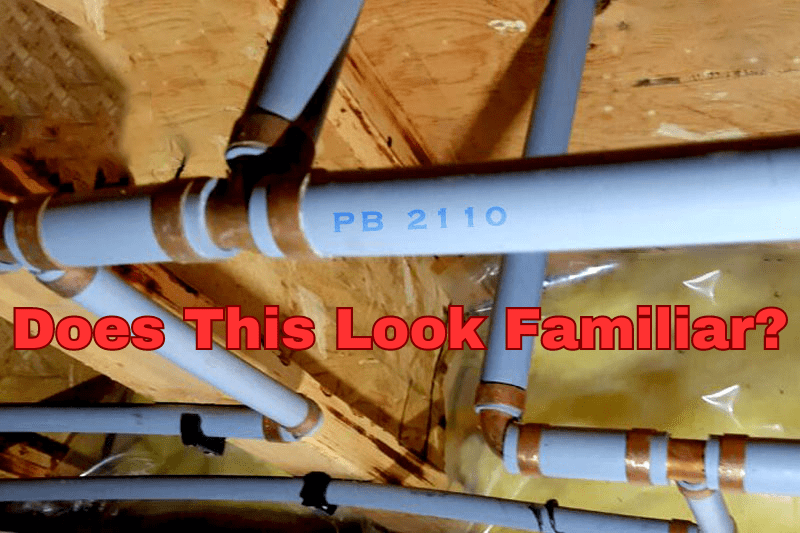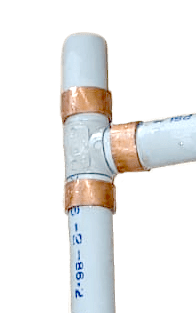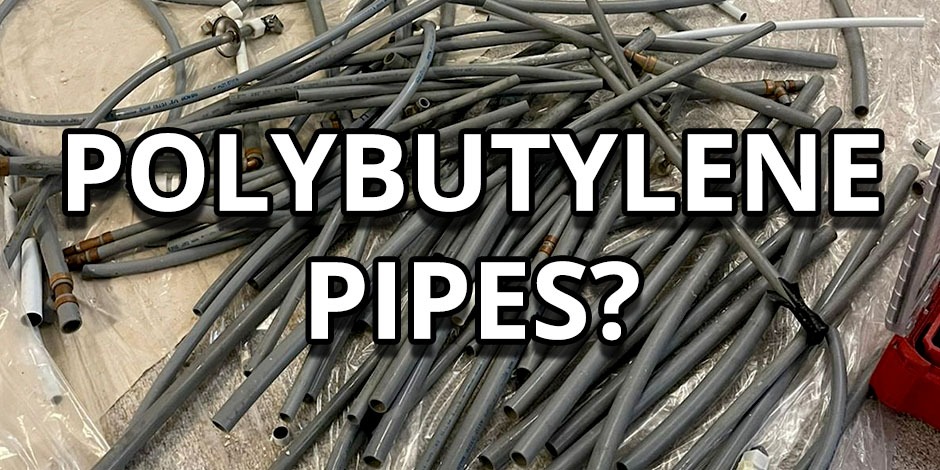Polybutylene pipes are a type of plastic pipe that was a popular alternative to copper piping from 1978 until 1995.
Over a couple of decades, Polybutylene pipes were used as water supply pipes in millions of homes in Canada and the United States.
These days, Polybutylene piping is only discussed when you’re discussing their replacement with a plumber.
Let’s find out why!
What are Polybutylene Pipes?
Polybutylene pipes are a type of plastic pipe that began wide adoption in 1978.
They have a ton of benefits, such as:
Easy To Install
Good Temperature Resistance
Flexibility
Quiet
No Corrosion or Calcification
Good Hydrostatic Pressure Resistance
And, most importantly: Polybutylene piping was cheap (compared to copper)!
However, they have one main drawback, and it was severe enough that Polybutylene pipes are no longer installed in Canada and the U.S.
In fact, Polybutylene Pipes have been removed from the Canadian Plumbing Codes list of acceptable materials since 2006!

Why Are Polybutylene Pipes Bad?
Simply put, they’re risky. Polybutylene pipes often don’t last.
PB Piping (polybutylene piping) initially grew rapidly in popularity. It was durable, easy to install, and inexpensive. As a result, it was quickly adopted far and wide.
The issue, however, is product testing wasn’t as fine-tuned back then as it is today. Back in the 70’s, new types of piping weren’t subjected to the same level of testing, and nobody knew what was to come.
Unknowingly to manufacturers and customers, polybutylene pipes reacted to disinfectants and treatments in the water. Evidence suggests that after ten or twenty years of chlorine-treated water running through the poly pipes, the insides of the pipes can begin to flake and the pipe can eventually crack.
Many homes built between 1978 and 1995, when Polybutylene piping was growing in popularity, have dealt with leaks, pipe repairs, and repiping.
To this day, there are still many homes with Poly-B Plumbing Systems. However, Polybutylene Pipe Replacements are the bread and butter of many plumbing companies.
What Do Polybutylene Pipes Look Like? How To Identify Poly-B
Clear Indicators of Polybutylene Pipe:
- Polybutylene pipes are plastic pipes that are usually light grey. (Note: They can also be blue or black)
- “PB2110” is usually stamped somewhere on the pipe.
Other Signs To Watch Out For:
- Polybutylene pipes may have copper crimps and connections
- Polybutylene pipe is flexible and sometimes curved.
- They’re water supply pipes, so they are thinner than drain pipes. (Usually 1/2″ to 1″ in diameter)

Not All Plastic Pipes Are Polybutylene
It’s important to note that not every plastic pipe is a polybutylene pipe.
Other common plastic pipes include:
PEX Pipes are currently very popular alternatives to copper piping. You can usually tell them apart from PB piping due to their colours: blue or red. However, PEX can also come in white and gray.

PVC Pipe is a white plastic pipe that is usually only used for drain piping. As such, they tend to be thicker than water supply lines. Additionally, “PVC” is often stamped on the pipe.
CPVC looks similar to PVC. However, it’s cream coloured.
What Causes Polybutylene Pipes to Leak?
Evidence suggests that certain treatment compounds in municipal water (e.g. chlorine and chloramine) can cause polybutylene pipes to degrade and deteriorate from the inside out.
Eventually, this deterioration can result in cracks, leaks, and bursts.
How long do Polybutylene pipes usually last? Poly-B Life Expectancy
Although Polybutylene piping may last up to 30 years, many polybutylene plumbing systems fail in as early as ten years.
Due to the nature of water, we strongly urge homeowners with Polybutylene piping to replace their piping systems before they find out the hard way that their PB pipes are no longer suitable.
Do Polybutylene Pipes Always Fail?
There is no guarantee that a polybutylene plumbing system will fail.
However, it’s important to note that Polybutylene pipes are no longer on the list of acceptable building materials. This is due to the high risk involved in polybutylene piping materials.
Any plumbing system can fail at any time. However, Polybutylene is considered a far higher risk than other materials like copper or PEX.
Is Polybutylene Safe for Drinking Water?
It’s considered safe to drink and was widely used as supply pipes for potable water.
However, due to the evidence suggesting that Polybutylene piping deteriorates and flakes, we are not entirely confident.
These days, there is growing talk about microplastics and the risks they may carry.
Are Polybutylene Pipes Still Used?
Polybutylene plumbing systems still exist, and there are currently countless residential plumbing systems using poly piping. However, Polybutylene pipes have not been on the list of acceptable building materials since 2005.
In fact, PB pipes haven’t been used much since 1995. If your home is younger than 1995, chances are high that your plumbing system uses a different plumbing pipe.
Are Polybutylene Pipes Illegal?
Polybutylene pipes are not illegal. However, polybutylene pipes were banned from new construction projects after 1995.
That being said, no one is forced to replace their Polybutylene plumbing with another material.
Polybutylene Pipe Vs Pex - How Do We Know PEX Will Last Longer Than Polybutylene Pipes?
Nobody uses Polybutylene Pipes anymore, but PEX seems to be growing in popularity.
If PEX pipes are also plastic resin, do they not have the same risks?
The short answer is no.
Modern products are subjected to far more testing than their predecessors. PEX pipes were tested and met international and national standards, some examples of modern standards include: CAN/CSA-B137 Series-05, CSA B137.5:20, CSA B137.10, ASTM F1807, NSF/ANSI 14, SF/ANSI/CAN 61, ISO1167, ASTM D 1598, ASTM D 1599, ISO3127, EN 744, ISO 1133-1:2022, EN1411, ISO75, ISO306, ISO2507, to name a few.
The various testing that PEX and other modern plastic pipe materials are subjected to are to determine potability, durability in various conditions, lifespan, and more.
Due to the stringent testing that PEX has passed, PEX has been determined to be suitable for home plumbing systems, among other purposes. It lasts longer and is more reliable than its Polybutylene predecessor.
Are Polybutylene Pipes Covered By Homeowners Insurance?
Unlikely.
Insurance companies generally no longer cover Polybutylene plumbing due to the liability and risk.
Risks Associated With Poly-B Plumbing
There are many reasons that Polybutylene pipes are no longer used (and, against building codes).
Some of which include:
Risk Of Cracking And Leaks
Fragility As They Age
Potential For Mold
Potential For Water Damage
Health Concerns And Microplastics
Inability To Acquire Insurance
Possibility Of Issues When Selling The Home
How Much Does It Cost To Replace Polybutylene Pipes?
There are many variables that affect the price of a Polybutylene pipe replacement.
Some variables include:
- Are we replacing a segment of pipe or an entire water supply system?
- How many bathrooms need to be repiped?
- How big is the home?
- Are we repiping the entire home with PEX pipe?
- Are we repiping the home with copper?
- Are we opening the walls and ceilings?
- Is the drywall being replaced and repainted by professionals or by the homeowner?
- While the walls are open and we’re repiping, are we replacing old shower valves?
The replacement plumbing costs for a whole-home repipe to PEX pipe is usually between $4,000 on the low end and $8,000 on the high end. Of course, these numbers can vary.
However, if you’re having your whole home repiped and hiring contractors to drywall and paint, the whole job might cost as much as $15,000-$20,000.
It’s important to note that these numbers can vary. Your home might cost less than the prices mentioned above, or they could potentially cost more. These are rough ballpark figures.
Who Should You Call For Polybutylene Pipe Replacement?
If you want honest plumbers, reasonable prices, high-quality work, and a great warranty, John The Plumber would love the opportunity to help.
We strongly recommend hiring professional plumbers to handle your plumbing, especially big jobs such as these.
John The Plumber is proud to be the plumber Ottawa trusts with repipes and plumbing renovations.
Our plumbers are professional, friendly, upfront, and have integrity. You can expect top-notch professionals at fair prices.
If you are considering replacing a PB Pipe system, call John The Plumber and schedule a quote with one of our plumbing experts!






